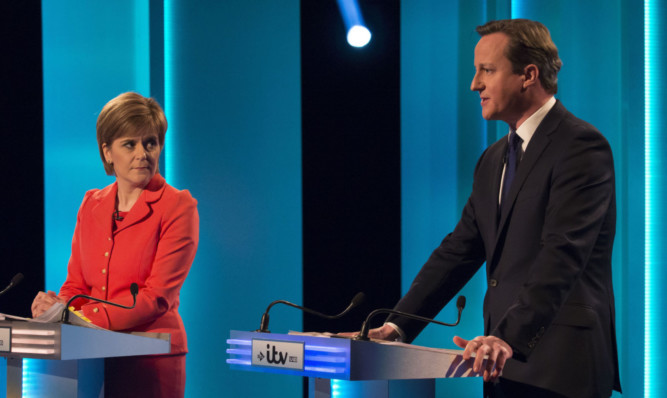If anyone doubted the general election campaign in Scotland was a rerun of last September’s independence referendum, the saga of the leaked memo should convince them.
For those in a news blackout over Easter, the memo was written by a civil servant after a conversation with the French consul general and appeared to reveal our First Minister’s preference for a Tory prime minister.
Nicola Sturgeon quickly denied that during a meeting with the French ambassador she ever said she would rather see David Cameron in Downing Street because Ed Miliband was not very “prime ministerial”. And the French team backed up her version of events.
There is now a leaks inquiry by the Cabinet Office but unless (completely objective) minutes of the meeting emerge, we might never discover the truth.
So, as with the promises made by politicians, it boils down to whom you believe.
The civil servant, despite Nationalist claims, appeared unmotivated by politics, even writing: “I have to admit that I’m not sure that the FM’s tongue would be quite so loose on that kind of thing in a meeting like that, so it might well be a case of something being lost in translation.”
That does not sound like a propagandist seeking to embarrass the Nationalist leader, as her supporters have suggested but a note-taker genuinely surprised by what he has heard.
The consul general, Pierre-Alain Coffinier, meanwhile, seems more interested in protecting his Edinburgh relationships than laying all the facts before the public.
When it became clear that the leak emanated from the Scotland Office, he said: “I’m not going to help them to get one of my friends because these people are my friends to help pin it down on him or her.”
Mmm is this a man wronged or a professional diplomat, alarmed by the trouble he has caused, seeking to draw a veil over things?
Sturgeon, for her part, is keen to shift the focus from what she said (or didn’t say) to the process, attacking the messengers the mandarin who leaked and the paper that published the leak rather than the message.
“There should no longer be any questions to me about whether I’ve said these things,” she said.
But why not? In the middle of a general election, especially such a tightly contested one, a minority party’s support for either of the main parties is a relevant concern for voters.
The SNP hopes to hold the balance of power should Cameron or Miliband fail to win a majority on May 7.
It has ruled out any deal with the Conservatives but has offered its services to Labour. However, what Nationalist strategists are apparently saying in private and what many political observers point out is that it would suit Sturgeon if Cameron was re-elected. That way, the separatists could carry on battling the British government and making their case for independence.
If they were within that government, propping up a minority Labour administration, the road to secession would be murkier.
Given the hidden agendas that are the backdrop to this election, the public has every right to know where their leaders stand. But as we found out last year, the Nationalists do not like lights shone into their inner workings.
When the BBC’s political editor, Nick Robinson, asked Alex Salmond about RBS’s plans to relocate its headquarters to London if there was a Yes vote, he was accused of being part of a “Westminster-led plot” to derail independence.
Salmond wrote to the Cabinet Secretary to demand an investigation into the apparent leaking of “market sensitive information” about RBS.
Robinson was duly hounded by cybernats and required a bodyguard on a subsequent visit to Scotland.
Sound familiar? Over the past few days, another BBC journalist, James Cook, has become the latest target for Nationalist bile for daring to ask Sturgeon about that memo.
A seasoned reporter of Scottish politics, Cook was taken aback and tweeted: “What an extraordinary level of vicious abuse I have received today for simply reporting the news. Is this the country we want, folks? Is it?”
A country that would not just shut down its critics but also the entire debate? No thanks, as most of us said barely seven months ago.
